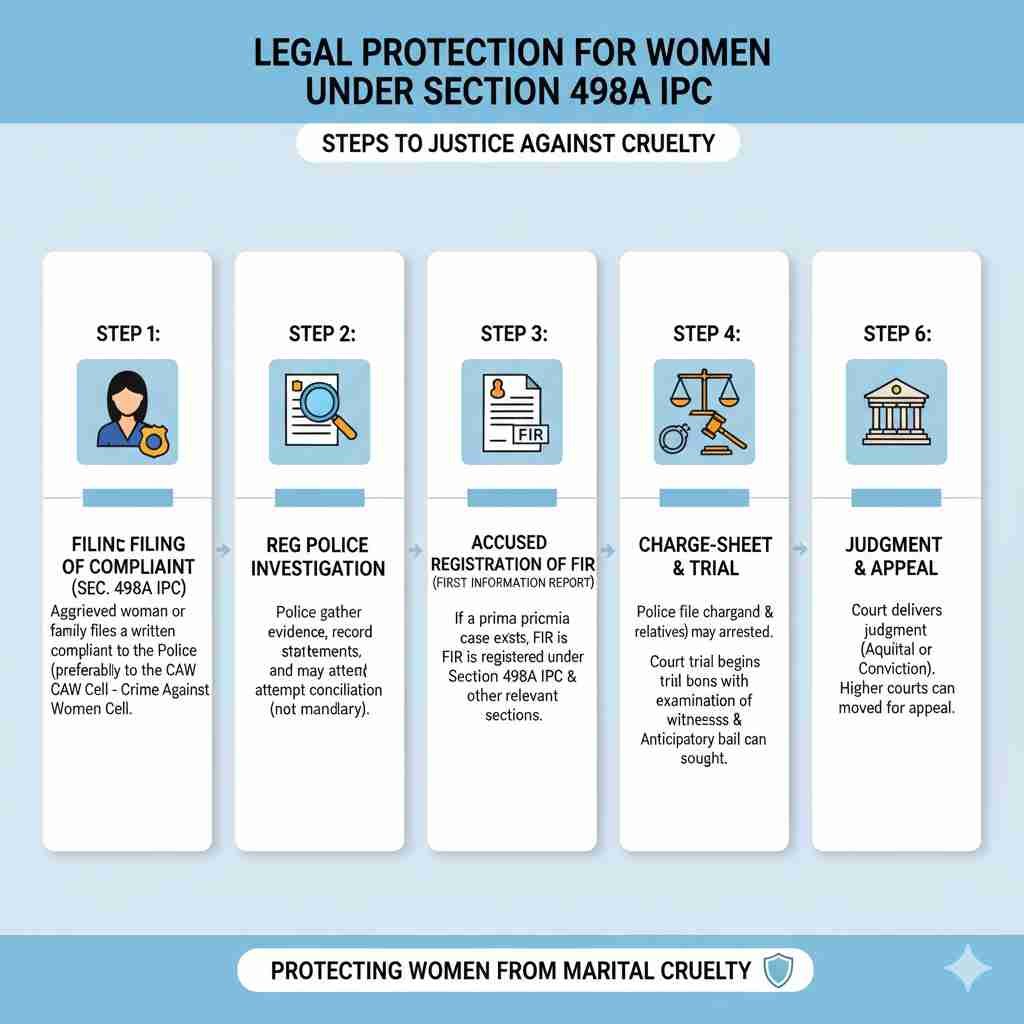Protecting women from cruelty within marriage remains one of the most important responsibilities of modern legal systems. In India, Section 498A of the Indian Penal Code (IPC) plays a vital role in safeguarding married women from abuse, harassment, and violence. At Legacy Family Court Law Firm: Chennai Divorce Experts, we help women understand their rights and guide them through each step with clarity, compassion, and strong legal support.
Legal Protection for Women Under Section 498A of the Indian Penal Code – Legacy Family Court Law Firm

Understanding Section 498A IPC
Section 498A is a special criminal provision introduced in 1983 to fight cruelty against married women. It covers physical, emotional, mental, and financial cruelty inflicted by the husband or his relatives. Importantly, the law does not limit itself to physical violence. Instead, it includes any behaviour that causes harm, pressure, or harassment.
The law also deals strictly with dowry-related harassment, which continues to be a major concern across India. Because abuse inside marriage often stays hidden, the law gives women a strong and immediate tool to seek protection.
What Is Cruelty Under Section 498A?
The law defines cruelty in two broad ways:
1. Cruelty Causing Physical or Mental Harm
This includes:
- Beating, slapping, or physical assault
- Humiliation, threats, or abusive behaviour
- Continuous verbal assaults that harm mental health
- Forcing the woman to stay away from her family
- Pressuring her to leave her job or education against her will
2. Dowry-Related Harassment
Any demand for money, gold, gifts, or property qualifies as dowry harassment. Even subtle pressure—such as comparisons, taunts, or emotional manipulation—can also fall under cruelty.
Thus, Section 498A covers a wide range of harmful actions, ensuring women receive protection from all types of abuse.
Why Section 498A Matters
Many women hesitate to speak out due to fear, dependence, or social pressure. This law gives them:
- Legal recognition of their suffering
- A mechanism to file a criminal case
- Immediate protection from further harm
- A formal path to justice
With this law, the burden of silence reduces, and women can confidently stand up against violence.
Who Can Be Accused Under Section 498A?
Although the law primarily focuses on the husband, it also covers:
- Husband’s parents
- Husband’s siblings
- Close relatives living in the same household
- Any family member directly involved in the cruelty
This wide coverage ensures that no offender escapes responsibility.
How to File a Complaint Under Section 498A
The process may feel overwhelming, but it becomes easier when you understand the steps. At our law firm, we guide clients through each stage:
Step 1: Visit the Police Station
A woman can file a complaint at:
- The local police station
- The Women’s Police Station
- The nearest All-Women Police Desk
The police will record the FIR (First Information Report).
Step 2: Submit a Detailed Written Complaint
This complaint should clearly explain:
- The incidents of cruelty
- Dates or approximate time periods
- Names of the people involved
- Any available evidence
Step 3: Police Investigation
Once the FIR is filed, the police:
- Record statements
- Visit the home
- Speak with witnesses
- Collect evidence
- Determine whether an arrest is necessary
Step 4: Court Process Begins
After investigation, the police file a charge sheet, and the case proceeds in court.
Additional Legal Support Available to Women
Although Section 498A is powerful, women often need additional support. Fortunately, several other legal remedies are available:
1. Domestic Violence Act, 2005
Provides:
- Protection orders
- Residence orders
- Monetary relief
- Counselling
- Protection officers’ assistance
2. Maintenance Under Section 125 CrPC
Allows a woman to claim monthly financial support from her husband.
3. Divorce or Judicial Separation
If the cruelty becomes unbearable, the woman can seek:
- Divorce based on cruelty
- Child custody
- Alimony and property rights
4. Dowry Prohibition Act
Helps take strict action against dowry demands.
Through a combination of these laws, women can secure safety, financial stability, and long-term independence.
Misuse Concerns and the Need for Balance
Over the years, some critics have argued that Section 498A is sometimes misused. As a result, courts have insisted on:
- Careful police investigation
- Fair treatment of accused persons
- Encouraging mediation in suitable cases
- Avoiding unnecessary arrests
Even though misuse exists in a small number of cases, the truth remains that most women come forward only after facing long-term trauma. Therefore, the law continues to act as a shield for genuine victims.
Role of Lawyers in 498A Cases
At Legacy Family Court Law Firm: Chennai Divorce Experts, we believe legal guidance is crucial because these cases are sensitive and complex. A well-experienced lawyer helps by:
- Recording incidents accurately
- Collecting strong evidence
- Filing the FIR properly
- Ensuring the woman’s safety
- Guiding her through court procedures
- Supporting her emotionally and legally
- Protecting her rights during mediation or settlement
Strong legal support reduces confusion and empowers women to make informed decisions.
Evidence That Helps in a 498A Case
Although women are often afraid to record their suffering, evidence strengthens the case. Useful evidence includes:
- Text messages, WhatsApp chats, or emails
- Photographs of injuries
- Hospital records
- Audio or video recordings
- Witness statements
- Bank records showing dowry-related payments
- Personal diary entries
- Previous complaints made to elders or police
Even if evidence seems small, it still counts.
What Women Should Do When Facing Cruelty
When cruelty becomes frequent, the following steps help protect safety:
- Tell a trusted person such as a parent, sibling, or friend.
- Save evidence such as messages, recordings, or medical reports.
- Seek medical help if physically injured.
- Consult a family lawyer early to understand legal rights.
- File a police complaint when cruelty continues.
- Seek counselling or support services to stay mentally strong.
Acting early often prevents further harm.
How the Court Handles 498A Cases
Once the case reaches court:
- The judge reviews the FIR and charge sheet.
- Witnesses testify.
- Evidence is examined carefully.
- Both sides present arguments.
If the court finds the accused guilty, they may face imprisonment, fines, and other penalties. This ensures accountability and discourages further abuse.
Why Legal Awareness Is Important
Even today, many women do not know that cruelty within marriage is a punishable crime. Many tolerate abuse because they fear social judgment or financial instability. That is why increasing awareness is essential.
When women understand their rights, they can:
- Resist abuse confidently
- Protect themselves legally
- Secure a safer future
- Take control of their lives
Creating awareness ensures more women come forward without fear.
How Legacy Family Court Law Firm Helps Women
As Chennai’s trusted divorce and family law experts, we provide:
- Confidential consultations
- Step-by-step legal guidance
- Assistance in filing 498A complaints
- Strong representation in court
- Counselling and support during emotional distress
- Help with maintenance, custody, and divorce if needed
We always act with empathy because we understand the emotional pain behind every case.
Frequently Asked Questions
Section 498A IPC protects married women from cruelty by their husbands or in-laws. It covers physical violence, mental harassment, emotional abuse, and dowry-related demands. When a woman files a complaint, the police register an FIR, start an investigation, and provide immediate protection. This law ensures that cruelty inside marriage is taken seriously and treated as a punishable offence.
Cruelty includes physical harm, continuous verbal abuse, threats, humiliation, dowry pressure, and behaviour that affects mental health. It also covers forcing a woman to leave her job, isolating her from family, and demanding cash, gold, or property. Even repeated emotional manipulation can qualify as cruelty if it causes serious distress.
Yes. The law allows action not only against the husband but also against his parents, siblings, or relatives who participate in the cruelty. Any family member involved in harassment, dowry demands, or abusive behaviour may be included in the FIR. This ensures comprehensive protection for the woman.
A woman can file a complaint at the local police station, Women’s Police Station, or through online grievance portals. She must submit a written statement describing incidents of cruelty. After the FIR is filed, the police record statements, collect evidence, and start the investigation. Legal assistance helps ensure accuracy and safety.
Although misuse occurs occasionally, most complaints are genuine. Courts handle misuse claims by ensuring proper investigation, preventing unnecessary arrests, and encouraging mediation when appropriate. The aim is to balance women’s safety with fair legal process.
Conclusion
Section 498A of the Indian Penal Code remains one of the strongest legal protections for married women facing cruelty. Although marital problems are sensitive, the law steps in when abuse becomes harmful, dangerous, or unbearable. Women have every right to live with dignity, safety, and respect.
At Legacy Family Court Law Firm: Chennai Divorce Experts, we continue to guide women through every step with care, strength, and professionalism. With proper legal support, every woman can reclaim her peace, protect her rights, and build a life free from cruelty.
Read More
- Get Justice for Dowry Death Under Section 304B IPC
- Fight Dowry Cases Under Section 304B of the Indian Penal Code
- Marriage Dissolution Guidance Under the Indian Divorce Act
- Legal Help for Christian Marriages Under the Indian Christian Marriage Act
- Secure Your Alimony Rights Under Section 25 of the Hindu Marriage Act
- Ministry of Home Affairs – IPC Section 498A (PDF)


